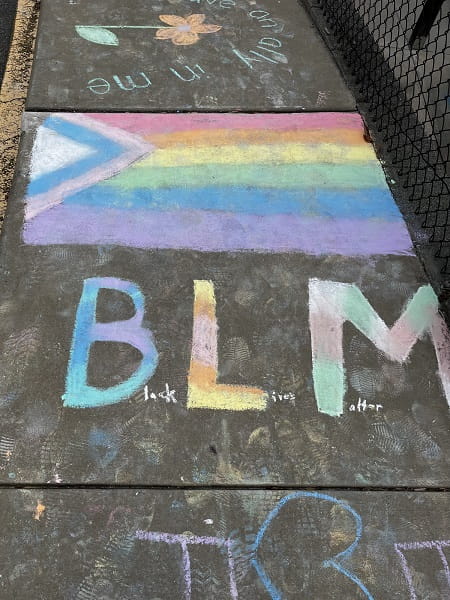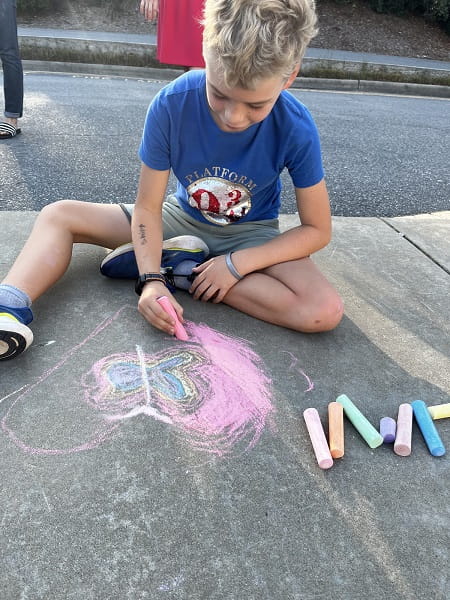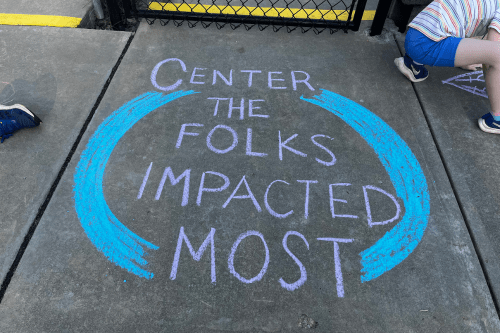In its truest form, Montessori education is a pedagogy of acceptance, love, and understanding. Maria Montessori developed a philosophy that preceded her time supporting the work of diversity, equity, and inclusion. She affirmed that “The needs of mankind are universal,” attesting that, “Our means of meeting them create the richness and diversity of the planet. The Montessori child should come to relish the texture of that diversity.”
Montessori School of Durham (MSD), an AMS-accredited member school in Durham, NC, made a commitment to their community to develop a space that promotes and honors this type of richness and diversity. Their mission statement reads, “Montessori School of Durham welcomes a diverse, inclusive community and celebrates the uniqueness of all of its members as part of our hope for a peaceful world. All are welcomed. All are valued.”
To continue their ongoing work of creating safe and inclusive spaces for staff, students, and families, MSD partnered with Rainbow Collective for Change (RCC), a collective of diverse community members working together to build LGBTQ+ and gender inclusive spaces. Anne Sutkowi-Hemstreet, a queer parent of two children at MSD and a leader and co-founder of RCC works with her team to provide tools and training for schools, families, and organizations to be LGBTQ+ and gender inclusive.
 RCC has developed “Rainbow Kits” for each of the classrooms at MSD that include children’s books featuring diverse families and other topics related to inclusion. The kits were designed using the National Association for the Education of Young Children’s (NAEYC) framework for Anti-Bias Education. They come in four levels (Infant/Toddler, Preschool – Kindergarten, 1st – 2nd grade, 3rd – 5th grade), and address the following themes:
RCC has developed “Rainbow Kits” for each of the classrooms at MSD that include children’s books featuring diverse families and other topics related to inclusion. The kits were designed using the National Association for the Education of Young Children’s (NAEYC) framework for Anti-Bias Education. They come in four levels (Infant/Toddler, Preschool – Kindergarten, 1st – 2nd grade, 3rd – 5th grade), and address the following themes:
- Who Am I?
- Same/Different/Diversity
- Love Makes a Family
- Identifying Feelings and Developing Empathy
- Unfairness/Justice
- Speaking Up Against Unfairness/Activism
The preschool through 5th grade kits include books that are tabbed to help guide developmentally appropriate discussions around anti-bias themes. The annotations include definitions and questions for adult readers to ask students during storytime to help facilitate meaningful conversations surrounding diversity and inclusion.
For example, in the book Calvin by JR and Vanessa Ford, there is a book tab that reads:
Questions for Students: What are pronouns? What pronouns did Calvin want to be called? What other changes did Calvin make to be himself (gender expression— hair, clothes)?
Answers:
- Pronouns are words that can take the place of your name like I, me, you, she, he, or they.
- Every person has a right to choose the pronouns that feel right for them.
- Calvin’s pronouns are he/him.
- Calvin wanted his hair short and to wear swim trunks.
Also included in the kits are lesson ideas, sample policies, conversation starters for staff and parents, and developmentally-appropriate, gender inclusive classroom materials.
Anne has not only provided training sessions for faculty on the use of the Rainbow Kits, but has also led a “Love Makes a Family” workshop for parents, celebrating diverse families and reinforcing the lessons and materials available to students in the classroom.
Given her passion for equity and inclusion, Anne wanted to take her work at MSD one step further. With the help of three other MSD staff members and tremendous support from multiple other faculty and community members, she formed the Rainbow Club. The Rainbow Club holds intentional space for LGBTQ+ students, students from LGBTQ+ families, students of color, students with disabilities, and allies to connect with each other, discuss topics related to diversity, intersectionality, and solidarity, and work together to speak up against injustices and inequalities in their school and community. The Rainbow Club at MSD also organizes activities that help make the school environment feel even more affirming to LGBTQ+ families and families of color.
 Earlier this year, the Rainbow Club at MSD hosted a Chalk for Justice Day as part of their Solidarity Week. Students, staff, and Board members came together to decorate the campus sidewalks with messages of solidarity. The group also built a Little Solidarity Library along the public sidewalk in front of the campus for MSD families and the greater Durham community to use as a resource for reading and learning more about diversity and inclusion. MSD also recently received the GroMoreGood Grassroots Grant and the Pride Specialty Award through Kids Gardening and the Rainbow Club looks forward to planting native plants in colors of the rainbow to beautify their library space.
Earlier this year, the Rainbow Club at MSD hosted a Chalk for Justice Day as part of their Solidarity Week. Students, staff, and Board members came together to decorate the campus sidewalks with messages of solidarity. The group also built a Little Solidarity Library along the public sidewalk in front of the campus for MSD families and the greater Durham community to use as a resource for reading and learning more about diversity and inclusion. MSD also recently received the GroMoreGood Grassroots Grant and the Pride Specialty Award through Kids Gardening and the Rainbow Club looks forward to planting native plants in colors of the rainbow to beautify their library space.
Students, staff, and families recognize the value and importance of the Rainbow Club and MSD’s intentional efforts to make their community a safe space for all. An Upper Elementary student at MSD shares, “I like how inclusive Rainbow Club is. No matter where you are, you fit in here.”
Scott McFarlane, Lower Elementary teacher at MSD states:
The Rainbow Kits give us tools to better assist in the authentic education of the whole child, including celebrating our identities, building empathy, and working together for solidarity. When a child feels loved and acknowledged for who they are, they are happier, more successful learners and community members. When children learn how to acknowledge the value and importance of others’ identities, they are becoming better community members.
MSD’s work to develop a diverse, inclusive community has created a culture of acceptance and understanding amongst students, families, and staff. The Rainbow Club and Rainbow Kits have inspired a sense of respect and belonging. As SK Fishback, MSD Upper Elementary parent, reminds us, this is not only the goal of Montessori education, but should be the goal for life:
The Rainbow Club brings to life themes from books we’ve read and conversations we’ve had. Elementary-aged children are naturally oriented toward fairness, and they are hearing first hand from classmates with diverse identities and backgrounds what love, care and belonging mean to them and their families. This life skill of bringing curiosity in order to learn how to be a friend or ally, and respecting identities different from our own serves the Montessori aim of peace. And beyond that, it contributes to meaningful connections and friendships that make life worth living.
References
Montessori, Maria. 1948. To Educate the Human Potential. Amsterdam, Netherlands: Montessori-Pierson.
Interested in writing a guest post for our blog? Let us know!
The opinions expressed in Montessori Life are those of the authors and do not necessarily represent the position of AMS.


